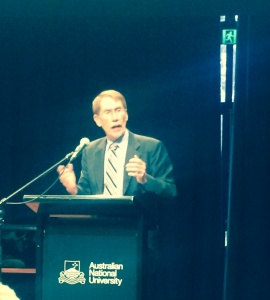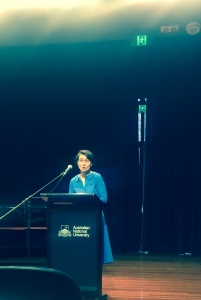IF MEMBERS of the ANU Music Students’ Association were expecting an apology today from the university’s Vice-Chancellor Ian Young on the line of Kevin Rudd’s’ 2008 apology to the stolen generations, they would have been sorely disappointed.

For although Professor Young fronted up to a promised meeting in the Larry Sitsky Recital Room this morning, flanked by his Deputy Vice-Chancellor (Academic) Marnie Hughes-Warrington, the interim Dean of the College of Arts and Social Sciences Paul Pickering, the newly-appointed interim Head of the School of Music Royston Gustavson and the ANU’s Dean of Students Paula Newitt, the best the assembled line-up could manage was regret for procedural omissions.
In a lengthy session involving some staff and a lot of very angry School of Music students (‘inappropriate,’ chorused the panel, better to be respectful) the university’s senior managers outlined their strategies to ensure that the school adequately was funded, with a vison for the future.
In the long list of matters canvassed were the sudden decision of the immediate past Head of School Peter Tregear to leave, the number of staff taking stress leave and the revelation that funds available for equipment purchase and instrument repair had not been used—the latter now rectified, Professor Gustavson said.
More seriously, there had been procedural shortcomings in finalising student’s grades and in the complex business of timetabling classes for those enrolled in double degrees — one of the few unique aspects to the ANU music degree. The new school manager, Kathleen Grant, previously manager at the Canberra International Music Festival, assured those present that she loved time tables and spread-sheets and was in the process of sorting out the issues.
As for the student’s suspicion that the appointment of two new staffers at professorial level (one to replace Professor Tregear, the other advertised some months ago to ensure efficiency at the top) meant two non-teaching positions, Professor Young emphasised that in his view, Professors did and would teach.
Professor Pickering spoke about equity across the academic disciplines, but both he and Professor Young acknowledged the needs of a performance school, saying an extra $1.4m had been allocated from the ANU budget, plus $600,000 from the College. Professor Pickering repeated several times his belief that there was sufficient funding for the school to operate adequately.
If the meeting did not see senior management in apologetic mood, it did see them ready and willing to meeting staff and students regularly, something Professor Gustavson said he has already initiated.

As well, Professor Hughes-Warrington said she was willing to launch an academic review of the Bachelor of Music. In reply to suggestions from the students that those on the panel were unfamiliar with the work of the school, she added that for her part, she had been a chorister at with the Trinity College choir in Cambridge, but had curtailed her visit to concerts in Canberra after having been accosted with accusations like, “you’re the one who did” [such and such] to the School of Music”.
Assuring those present that there was no plan to close the School of Music, Professor Hughes-Warrington expressed the hope that the adversarial tone in the discussion of the School, inflamed by the Canberra press, would give way to a more cooperative approach.
But in a lengthy Q&A following the presentation by members of the panel, a disconnect emerged. For those at the top appeared focussed on matters like budgeting and timetabling, while the students were concerned by poor standards, a decline in their school’s reputation and a “toxic culture” that had seen staff leaving. Professor Pickering was inclined to see staff mobility as advantageous.
One questioner asked why, in its present state, good staff would want to work at the School of Music, adding that most students came expecting to learn an instrument, only later developing an interest in the academic pursuit of musicology sought by the ANU.
Finally, there was the question of decreasing student numbers, with the possibility, one questioner said, of as few as 10 enrolling in first year next year.
As a music-law student put it, “it’s great to get confirmation that you are not closing us down, but WE might be closing IT down.”
Who can be trusted?
In a world of spin and confusion, there’s never been a more important time to support independent journalism in Canberra.
If you trust our work online and want to enforce the power of independent voices, I invite you to make a small contribution.
Every dollar of support is invested back into our journalism to help keep citynews.com.au strong and free.
Thank you,
Ian Meikle, editor




Leave a Reply